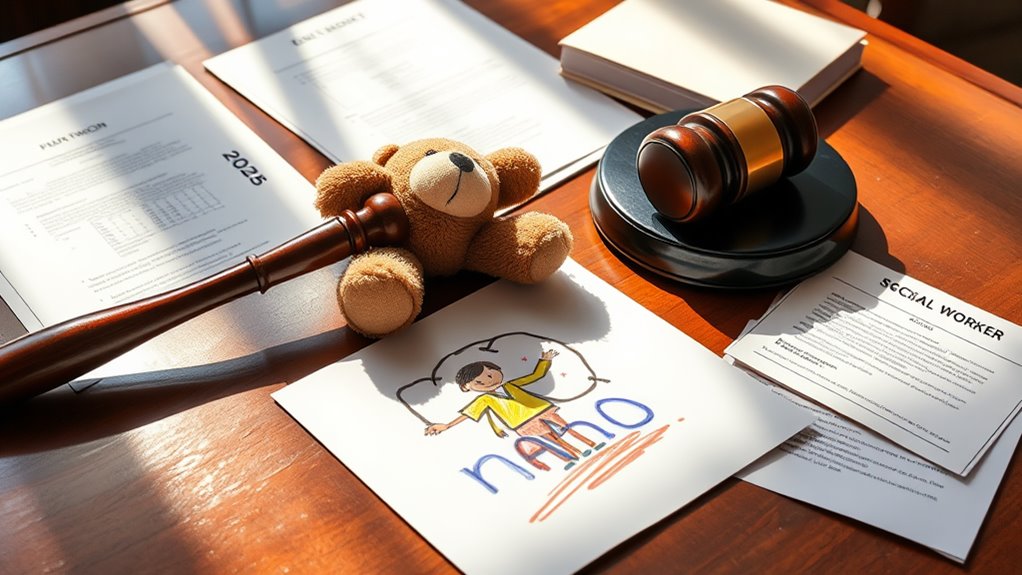In 2025, understanding child abuse legal guidelines entails maneuvering a complex framework that incorporates expanded definitions, mandatory reporting obligations, and the essential roles of Child Protective Services (CPS). Recent revisions prioritize children’s voices and experiences, ensuring their welfare and involvement in protective measures. Families face serious repercussions from allegations, emphasizing the need for legal support. Community engagement and education play important roles in prevention. Exploring specific strategies and resources reveals deeper insights into fostering safer environments for children.
Key Takeaways
- Child abuse laws in 2025 prioritize children’s voices, emphasizing their experiences in the legal definitions of abuse and neglect.
- Mandatory reporting requirements remain crucial, with professionals needing to understand specific procedures to ensure compliance and timely intervention.
- Child Protective Services (CPS) focuses on emotional and physical safety, utilizing compassionate engagement and collaboration with private investigators for case evaluations.
- Families facing allegations of abuse may struggle with emotional challenges, making access to legal aid and support resources essential for navigating the legal landscape.
- Future trends include increased community engagement, data-driven strategies for identifying at-risk populations, and a focus on rehabilitation and support for affected families.
Overview of Child Abuse Laws in 2025

As society evolves, the legal frameworks governing child abuse have become increasingly sophisticated, reflecting a growing understanding of the complexities surrounding such cases. By 2025, child welfare legislation has undergone significant legal reforms aimed at enhancing protective measures for children. These laws now prioritize a multidisciplinary approach, integrating insights from psychology, medicine, and social work to address the multifaceted nature of abuse. Key provisions emphasize the importance of early intervention, support services for affected families, and thorough training for professionals involved in child welfare. Additionally, the legal definitions of abuse have expanded to include emotional and psychological harm, ensuring that all aspects of a child’s well-being are considered. This evolution signals a compassionate commitment to safeguarding children’s rights and nurturing healthier environments. Furthermore, private investigators, like those at Stillinger Investigations, play a crucial role in gathering evidence for child custody issues, which can significantly impact legal decisions.
Key Changes in Legal Definitions of Child Abuse
In recent years, the legal definitions of child abuse have undergone critical transformations to better reflect the complexities of children’s experiences and the various forms of harm they may endure. These revisions aim to enhance child welfare by recognizing the nuanced and multifaceted nature of abuse, which now encompasses emotional and psychological dimensions alongside physical harm.
- Acknowledgment of neglect as a form of emotional abuse
- Recognition of the impact of digital exploitation
- Inclusion of systemic factors contributing to abuse
- Emphasis on the voices and experiences of children
Such changes signal a proactive approach, fostering a deeper understanding of child welfare and ensuring that legal definitions resonate with the realities faced by vulnerable children, ultimately promoting their protection and healing. Furthermore, the involvement of dedicated professionals in investigations can ensure that evidence collected effectively supports the case for custody.
Reporting Obligations for Professionals
Professionals working with children are often bound by mandatory reporting requirements, which dictate their legal obligation to report suspected child abuse. Understanding the specific reporting procedures and protocols is essential for these individuals, as it guarantees that they can act decisively and responsibly when they encounter potential cases of abuse. This section will explore the intricacies of these obligations, highlighting the importance of compliance in safeguarding the well-being of vulnerable children. Additionally, awareness of human trafficking definitions can aid professionals in recognizing signs of abuse that may be linked to trafficking situations.
Mandatory Reporting Requirements
While the responsibility to report suspected child abuse is critical, the specific reporting obligations for various professionals often vary by jurisdiction, creating a complex landscape that must be navigated carefully. Understanding mandatory reporting requirements is vital for those in fields related to child welfare. Professionals must not only recognize their legal duties but also the emotional weight of their decisions.
- The heart-wrenching possibility of a child suffering in silence
- The profound impact of timely intervention on a child’s future
- The ethical dilemma faced by those unsure of their reporting responsibilities
- The community’s responsibility to guarantee every child’s safety and well-being
Navigating these obligations requires both awareness and compassion, as the stakes are undeniably high.
Reporting Procedures and Protocols
Understanding the reporting procedures and protocols surrounding child abuse is vital for guaranteeing that vulnerable children receive the protection they need. Professionals are often the first line of defense, and familiarity with reporting mechanisms is imperative. Upon suspicion of abuse, mandated reporters must act swiftly, adhering to established documentation protocols to guarantee accuracy and reliability. Proper documentation not only supports investigations but also safeguards the welfare of the child involved. Additionally, professionals must be aware of local regulations governing the reporting process, as these can vary considerably. By fostering a culture of vigilance and empathy, society can create a safer environment for children, guaranteeing they are shielded from harm while receiving the necessary support to heal and thrive.
The Role of Child Protective Services
Child Protective Services (CPS) play an indispensable role in safeguarding the welfare of children who may be victims of abuse or neglect. Their mission encompasses implementing intervention strategies that prioritize the emotional and physical safety of vulnerable youth. By evaluating cases diligently and providing necessary resources, CPS endeavors to create a protective environment where children can thrive.
- Instilling hope in frightened hearts
- Offering a lifeline to those feeling trapped
- Restoring dignity to innocent lives
- Empowering families toward healing
Through compassionate engagement and a commitment to child welfare, CPS guarantees that every child receives the support they need. Their work often goes unnoticed, yet it serves as a vital backbone in the fight against child abuse and neglect, nurturing a future filled with promise. Furthermore, private investigators often assist CPS by providing critical evidence that aids in the assessment of child welfare cases.
Legal Rights of Children and Families

The framework of legal rights surrounding children and families is foundational to ensuring their protection and well-being in the context of abuse and neglect. In 2025, child rights are increasingly recognized as essential, mandating that every child is afforded protection from harm and the opportunity for a nurturing environment. Family advocacy plays a vital role, empowering families to understand their rights and navigate complex legal systems. This advocacy fosters a supportive landscape where families can seek justice and healing. Legal guidelines emphasize that children must be heard and their needs prioritized, reinforcing the importance of creating safe spaces. By intertwining child rights with family advocacy, a more empathetic approach emerges, aiming to preserve familial bonds while protecting vulnerable children from harm. Furthermore, the importance of hiring a private investigator can significantly aid in uncovering hidden issues that may jeopardize a child’s safety.
Consequences of Child Abuse Allegations
Allegations of child abuse carry profound and far-reaching consequences that affect not only the accused but also the alleged victims and their families. The emotional impact of such allegations can be devastating, leading to a cascade of suffering that often extends beyond the immediate situation.
- Erosion of trust within families and communities
- Long-lasting psychological trauma for victims
- Social stigma and isolation for the accused
- Potential disruption of children’s lives and wellbeing
These allegation consequences highlight the complex interplay of fear, shame, and guilt that permeates all involved. Families may find their bonds tested, while the accused often face an uphill battle to reclaim their reputations. Understanding these ramifications is essential for fostering empathy and support in the aftermath of such allegations. Additionally, the legal implications of infidelity can further complicate the dynamics in families already strained by such serious accusations.
Resources for Legal Support and Guidance
Accessing legal support and guidance is vital for individuals traversing the complexities of child abuse allegations. Legal aid organizations provide essential resources, offering expertise and representation to those who may feel overwhelmed by the judicial process. Additionally, online support resources serve as valuable tools, enabling individuals to find information and connect with services that can help them understand their rights and options. Engaging a licensed investigator can also provide critical insights into child custody matters and support legal proceedings.
Legal Aid Organizations
Maneuvering the complexities of legal issues related to child abuse can be overwhelming, especially for those directly affected. Legal aid organizations play a vital role in providing essential support and advocacy services for victims. These organizations not only offer legal representation but also help navigate the emotional turmoil that often accompanies such situations.
- Access to knowledgeable attorneys who specialize in child abuse cases
- Emotional support through counseling and community resources
- Assistance in understanding legal rights and options
- Empowerment through education about the legal process
Online Support Resources
For individuals traversing the aftermath of child abuse, online support resources can serve as essential tools in understanding legal rights and options. These platforms offer a wealth of information, including legal guidelines and procedures tailored to the complexities of child abuse cases. Virtual counseling services provide a safe space for survivors to express their feelings and concerns, fostering emotional healing alongside legal guidance. Many organizations also host webinars and forums that connect users with legal experts, allowing for personalized advice in a supportive environment. By utilizing these online support systems, survivors can navigate their paths with greater confidence, ensuring they are informed and empowered to pursue justice and healing in their lives.
Prevention Programs and Community Involvement
Although numerous factors contribute to the incidence of child abuse, effective prevention programs and robust community involvement serve as critical components in mitigating these risks. Community engagement fosters a supportive environment where families feel valued and connected. Tailored prevention strategies can empower individuals to recognize warning signs and respond appropriately.
- Strengthening family bonds through education and support
- Promoting awareness of local resources and services
- Encouraging open dialogue about child welfare
- Mobilizing community members to advocate for vulnerable children
- Engaging in community campaigns to raise awareness about child exploitation and the importance of supporting affected families.
Future Trends in Child Abuse Legislation

As communities increasingly recognize the importance of prevention programs in addressing child welfare, the legislative landscape surrounding child abuse is also evolving. Future legislation is expected to reflect a more all-encompassing approach, emphasizing not only punitive measures but also rehabilitation and support for affected families. Policymakers are likely to prioritize thorough training for professionals in child services, aiming to foster a more empathetic understanding of abuse’s complexities. Additionally, there may be an increased focus on data-driven strategies to identify at-risk populations early, shaping targeted interventions. These shifts will carry profound policy implications, encouraging collaboration among agencies and communities, while fostering an environment where children can thrive free from harm, ultimately redefining the legal framework surrounding child protection in society. Furthermore, the integration of exhaustive discovery review into child abuse investigations will enhance case outcomes and support more informed decision-making.
Frequently Asked Questions
How Can I Report Suspected Child Abuse Anonymously?
To report suspected child abuse anonymously, individuals can contact local child protection agencies or hotlines. These organizations provide confidential services, ensuring safety for the reporter while prioritizing the child’s welfare and necessary interventions in potential abuse situations.
What Are the Penalties for False Child Abuse Allegations?
The penalties for false child abuse allegations can be severe, encompassing both civil and criminal repercussions. False accusations may lead to legal consequences, including fines or imprisonment, reflecting the serious impact such claims can have on individuals’ lives.
Can Children Testify in Court About Their Abuse?
The courtroom process allows for child testimony, often requiring specialized methods to guarantee comfort and clarity. Judges consider the child’s age and emotional state, aiming to balance justice with the child’s well-being during sensitive proceedings.
How Do Cultural Factors Influence Child Abuse Cases Legally?
Cultural perceptions greatly shape child abuse cases, influencing both victim reporting and legal responses. Legal implications arise from differing societal norms, impacting jury decisions and the interpretation of evidence, ultimately affecting justice for vulnerable children.
What Should I Do if I’M Wrongfully Accused of Child Abuse?
When wrongfully accused of child abuse, one should seek legal defense immediately while gathering emotional support from trusted friends or professionals. Steering through such accusations requires a careful balance of protecting oneself and addressing emotional turmoil.
Conclusion
In 2025, the landscape of child abuse laws reflects a growing recognition of the complexities surrounding abuse and the need for thorough protective measures. By addressing key shifts in legal definitions, reporting obligations, and the rights of affected families, the legal framework aims to foster a more supportive environment for children. As communities engage in prevention efforts and legal resources expand, a collaborative approach emerges, signaling a hopeful trajectory towards enhanced protection and understanding of child welfare in society.






